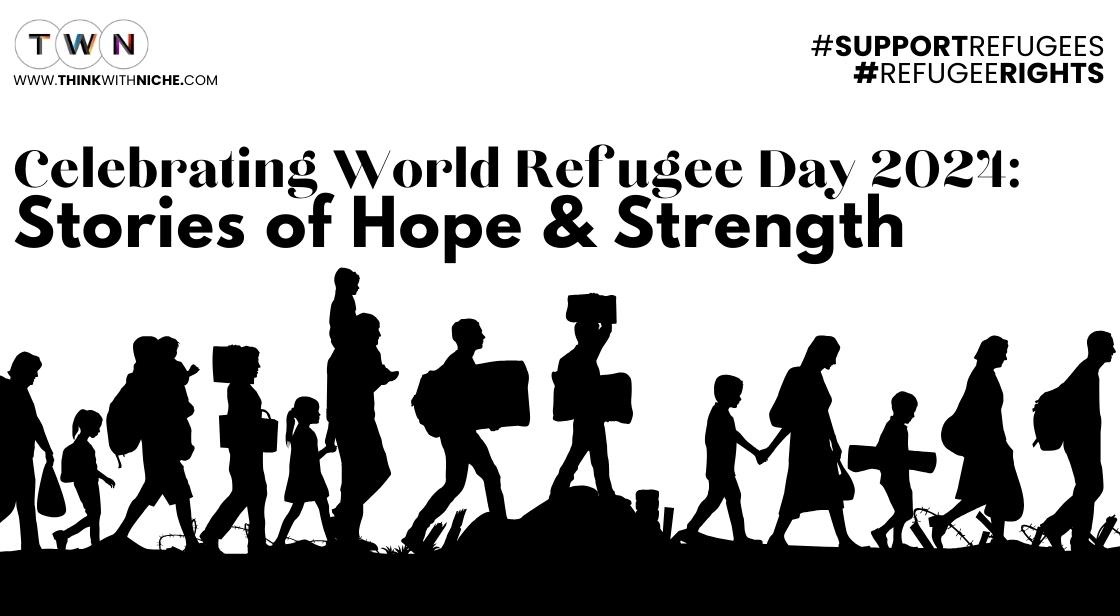Celebrating World Refugee Day 2024: Stories of Hope and Strength

Blog Post
Every year on 20 June, WHO collaborates with UNHCR, the UN Refugee Agency, and partners to observe World Refugee Day. This year’s campaign focuses on fostering solidarity with refugees, advocating for a world where refugees are welcomed, and emphasizing the importance of including them in universal health coverage.
An estimated 117.3 million people have been forced to leave globally by the end of 2023 for a variety of causes, including persecution, conflict, violence, abuses of human rights, and serious disturbances to public order.
Refugees often have distinct health needs stemming from pre-existing conditions, social circumstances, and the hazards encountered during their journeys. These challenges are compounded by experiences of discrimination, isolation, limited access to health and social services, and substandard living and working conditions—all of which adversely affect their health and overall well-being.
In addition, language hurdles and cultural acquaintance with the healthcare systems of their new nation are common obstacles faced by migrants. This lack of understanding can prevent them from accessing appropriate health services and understanding their entitlements, thereby jeopardizing their right to adequate healthcare.
Addressing these challenges requires concerted efforts to bridge gaps in healthcare provision and ensure refugees receive the support they need. It also necessitates promoting inclusive policies that uphold refugees’ rights to health and well-being, fostering environments where they can integrate and contribute positively to society despite their displacement.
#SupportRefugees #WorldRefugeeDay2024 #RefugeeRights
Honoring Refugees on World Refugee Day 2024: A Global Perspective
History and Purpose of World Refugee Day 2024
History of World Refugee Day- World Refugee Day was established by the United Nations General Assembly in 2000 to commemorate the courage and resilience of millions of refugees worldwide. It is observed annually on June 20th, chosen to coincide with the anniversary of the 1951 Refugee Convention. This day serves as a reminder of the urgent need to support refugees and recognize their rights under international law.
Purpose of World Refugee Day- The primary purpose of World Refugee Day is to raise awareness about the plight of refugees and mobilize support for their protection and well-being. It aims to foster empathy and solidarity towards refugees, promote tolerance, and advocate for policies that ensure their safety and dignity. Through various events and initiatives globally, the day encourages individuals, communities, and governments to stand with refugees and take action to address the root causes of displacement.
For example, on World Refugee Day 2024, communities around the world will organize events such as panel discussions, cultural performances, and fundraising drives to amplify refugee voices and highlight their contributions to society. NGOs and international organizations will use this platform to call for increased humanitarian aid and improved policies to support refugees globally.
Theme of World Refugee Day 2024
For 2024, "Hope Away from Home" is the theme of World Refugee Day. June 20 is the day for this yearly celebration, which honors the bravery and fortitude of those who have had to leave their own nations because of persecution or violence.
On this day, awareness should be raised about the needs, rights, and aspirations of refugees everywhere. Together, let's support people who are looking for security and a brighter tomorrow.
Significance of World Refugee Day
World Refugee Day holds significant importance as a global platform to advocate for the rights and well-being of refugees. It underscores the principles of humanity and solidarity, urging nations and communities to stand in support of those who have been forcibly displaced.
Beyond recognition, it serves as a call to action for governments, organizations, and individuals to work together in addressing the root causes of displacement and in providing essential assistance to refugees.
Global Scale and Impact of Refugee Crises
These crises have far-reaching impacts, affecting not only the individuals directly displaced but also their host communities and countries. The burden on infrastructure, services, and resources often strains economies and social systems, presenting complex challenges that require international cooperation and solutions.
Refugee crises also highlight broader issues of human rights violations, conflict resolution, and the importance of fostering peace and stability globally. The impact extends beyond immediate humanitarian assistance, influencing policies on immigration, asylum, and international relations.
Therefore, World Refugee Day serves as a crucial moment to reflect on our collective responsibility to protect and support vulnerable populations, reaffirming our commitment to uphold the dignity and rights of all individuals, regardless of their nationality or status.
Also Read: Promoting Safety on World Elder Abuse Awareness Day 2024: Honoring Our Seniors
Understanding the Refugee Experience
Understanding the refugee experience requires recognizing these multifaceted challenges and the resilience displayed by individuals and communities in rebuilding their lives. By acknowledging the diversity among refugees and understanding the complex factors that force them to flee, we can better advocate for policies and support systems that uphold their rights and dignity.
Definition and Forced Displacement
Refugees are individuals who have been forced to flee their homes due to persecution, conflict, violence, or human rights violations. They seek safety and protection in other countries, often unable or unwilling to return home due to fear of persecution or insecurity. The reasons for their displacement can vary widely, from ethnic or religious persecution to war and environmental disasters.
Diversity Among Refugees
Refugees represent diverse backgrounds in terms of ethnicity, religion, nationality, and socio-economic status. They come from all corners of the globe, with each individual and family carrying a unique story of survival and resilience. This diversity enriches the fabric of refugee communities but also presents challenges in terms of cultural adaptation and integration.
Common Challenges Refugees commonly face a myriad of challenges upon displacement. These include:
-
Legal and Administrative Hurdles: Navigating complex asylum processes and documentation requirements in host countries.
-
Lack of Basic Needs: Access to adequate housing, food, clean water, and healthcare can be scarce, especially in refugee camps.
-
Psychosocial Issues: Trauma, grief, and mental health concerns due to the loss of home, family separation, and exposure to violence.
-
Education and Employment: Limited access to education and employment opportunities, leading to long-term economic insecurity.
Global Refugee Statistics
As of 2024, the global refugee population remains a significant humanitarian concern, with millions displaced due to conflicts, persecution, and human rights violations worldwide.
Total Number of Refugees:
According to the latest data from the United Nations High Commissioner for Refugees (UNHCR), there are approximately 26 million refugees globally. This figure includes individuals who have fled their countries of origin and are unable or unwilling to return due to well-founded fears of persecution.
Regions Most Affected by Refugee Crises:
-
Middle East and North Africa (MENA): The MENA region continues to host a large proportion of the world's refugees, primarily due to ongoing conflicts in Syria, Yemen, and Iraq. Turkey, Lebanon, and Jordan are among the top countries hosting Syrian refugees, with significant impacts on their economies and social structures.
-
Sub-Saharan Africa: Countries like South Sudan, the Democratic Republic of Congo, and Somalia have ongoing conflicts and internal displacement issues, contributing to large refugee populations. Uganda, for example, hosts one of the largest refugee populations in Africa, primarily from South Sudan.
-
Asia-Pacific: Afghanistan and Myanmar are key contributors to the refugee crisis in Asia-Pacific. Bangladesh hosts a significant number of Rohingya refugees from Myanmar, while Afghanistan's neighboring countries, such as Pakistan and Iran, continue to accommodate Afghan refugees fleeing conflict and instability.
Impact and Response: The burden of hosting refugees often falls disproportionately on developing countries with limited resources and infrastructure. International organizations like the UNHCR work closely with host governments and NGOs to provide humanitarian aid, protection, and assistance to refugees. However, funding gaps and political challenges can hinder adequate support and integration efforts.
Understanding the scale and distribution of the global refugee crisis is crucial for addressing humanitarian needs and advocating for policies that promote stability, protection, and dignity for refugees worldwide.
Key Issues Facing Refugees
Refugees, individuals forced to flee their homes due to persecution, conflict, or violence, face multifaceted challenges that profoundly impact their lives and well-being.
Displacement and Physical Challenges
Refugees often endure traumatic journeys fleeing danger, resulting in displacement to unfamiliar and often overcrowded refugee camps or host communities. The abrupt disruption of normal life can lead to physical health issues exacerbated by inadequate shelter, sanitation, and healthcare access. Many refugees face food insecurity and lack access to clean water, which increases vulnerability to diseases.
Lack of Basic Needs
Basic needs such as food, water, and healthcare are frequently inadequate in refugee settings. Refugee camps, intended as temporary shelters, sometimes become long-term homes lacking essential infrastructure. Limited resources strain humanitarian aid efforts, leaving many refugees dependent on external assistance for survival.
Legal and Social Integration
Refugees encounter legal hurdles navigating complex asylum procedures in host countries. Legal status uncertainty often prolongs their vulnerability, affecting employment opportunities and access to education and healthcare. Social integration poses another challenge as cultural differences and language barriers hinder assimilation and community acceptance.
Mental Health Issues and Trauma
Displacement and exposure to violence or loss frequently lead to severe mental health challenges among refugees. Post-traumatic stress disorder (PTSD), depression, and anxiety are prevalent, exacerbated by uncertainty about the future and lack of psychosocial support services. Children are particularly vulnerable, facing disrupted education and long-term emotional scars.
Addressing these challenges requires concerted efforts from governments, international organizations, and civil society. Adequate humanitarian aid, inclusive policies promoting legal protection and social inclusion, and robust mental health support are crucial in restoring dignity and fostering resilience among refugees worldwide.
Contributions of Refugees
Refugees enrich their host communities in various ways, fostering cultural diversity, economic growth, and entrepreneurial spirit despite facing immense challenges.
Cultural Enrichment: Refugees bring a wealth of cultural diversity, enriching local communities with their traditions, arts, cuisine, and languages. For example, Syrian refugees in countries like Canada and Germany have introduced Middle Eastern cuisine and music scenes, contributing to vibrant cultural landscapes.
Economic Contributions: Many refugees actively contribute to their host countries' economies through labor force participation and entrepreneurial ventures. For example, in the United States, Vietnamese refugees have established successful businesses, creating jobs and stimulating local economies.
Entrepreneurship: Refugees often exhibit entrepreneurial spirit, launching businesses that benefit both themselves and their host communities. In Uganda, South Sudanese refugees have established agricultural enterprises, enhancing local food production and economic stability.
Success Stories of Rebuilding Lives: Refugees demonstrate resilience and determination in rebuilding their lives and communities. A notable example is the story of Rohingya refugees in Bangladesh, where initiatives led by refugees themselves have provided education and healthcare services, improving living conditions in overcrowded camps.
Community Integration: Refugees actively engage in community activities and social initiatives, fostering cross-cultural understanding and social cohesion. For example, Afghan refugees in Australia have integrated into local communities through sports clubs and cultural festivals, promoting mutual respect and solidarity.
International Response and Support
International organizations such as the United Nations High Commissioner for Refugees (UNHCR) and various non-governmental organizations (NGOs) play crucial roles in supporting refugees worldwide, offering both immediate assistance and long-term solutions.
International Organizations supporting refugees globally
The UNHCR, mandated to protect and assist refugees globally, coordinates efforts to provide essential services like shelter, healthcare, and education. It also works to ensure refugee rights are respected under international law, advocating for their safety and dignity.
NGOs complement these efforts with on-the-ground assistance tailored to specific refugee populations. Organizations like Doctors Without Borders (MSF) provide medical aid, while the International Rescue Committee (IRC) focuses on resettlement and integration programs.
Global Initiatives and Policies for refugee
Global initiatives aim to improve refugee protection and assistance through coordinated action and policy development. The Global Compact on Refugees, adopted by the UN General Assembly in 2018, emphasizes burden-sharing among countries hosting refugees, economic opportunities for refugees, and increased support for host communities.
Policies focus on enhancing legal frameworks for refugee protection and promoting inclusive societies. For example, countries like Canada have implemented innovative resettlement programs that prioritize refugee integration and economic self-sufficiency.
Challenges and Future Directions
Despite progress, challenges persist. Funding shortages often hinder effective response efforts, leaving refugees vulnerable to prolonged displacement and inadequate support. Moreover, political tensions and restrictive immigration policies in some regions complicate refugee resettlement and integration efforts.
Looking forward, fostering international cooperation, increasing funding commitments, and strengthening legal protections for refugees are critical. By prioritizing humanitarian principles and collective action, global initiatives can better address the complex challenges refugees face and ensure their rights and well-being are upheld globally.
Challenges and Opportunities Post-Pandemic
Impact of COVID-19 on Refugees
The COVID-19 pandemic exacerbated the challenges already faced by refugees worldwide. Many refugees live in overcrowded camps or urban settings with limited access to healthcare, clean water, and sanitation, making them particularly vulnerable to the spread of the virus.
Lockdowns and movement restrictions further isolated refugee communities, hindering access to essential services such as education, healthcare, and legal assistance. Economic downturns and job losses disproportionately affected refugees, many of whom work in informal sectors without social safety nets.
Opportunities for Improving Global Responses
Despite these challenges, the pandemic highlighted opportunities for enhancing global responses to future refugee crises:
-
Healthcare Infrastructure: Strengthening healthcare infrastructure in refugee camps and host communities can improve resilience against future health crises. Investing in telemedicine and mobile health units can ensure continued access to healthcare during emergencies.
-
Digital Inclusion: Promoting digital literacy and access to technology can facilitate remote learning and work opportunities for refugees, reducing dependence on physical services.
-
Social Protection: Implementing social protection programs tailored to refugees can mitigate economic vulnerabilities, ensuring access to basic needs during crises.
-
Collaboration and Coordination: Enhancing collaboration between governments, international organizations, and NGOs can streamline response efforts and ensure more effective resource allocation.
-
Legal and Social Integration: Strengthening legal frameworks and social integration policies can provide refugees with secure legal status and opportunities for long-term integration into host communities.
By learning from the challenges of the COVID-19 pandemic, the international community has an opportunity to build more resilient systems that prioritize the needs and rights of refugees, ensuring they receive adequate support during future crises.
Personal Stories and Voices of World Refugee Day: Inspiring Resilience and Hope
Anecdotes of Courage:
Refugees often demonstrate remarkable courage in the face of adversity. For example, Fatima, a Syrian refugee, recounted her journey of escaping conflict with her family, illustrating the strength required to navigate dangerous terrain and uncertain futures. These anecdotes humanize the refugee experience, shedding light on the personal sacrifices and challenges endured in pursuit of safety and stability.
Interviews with Refugees:
Interviews provide firsthand accounts of resilience and hope. Ahmad, a Rohingya refugee, shared how he rebuilt his life in a refugee camp in Bangladesh, emphasizing the importance of education and community support in overcoming trauma. Such interviews underscore the determination and resourcefulness of refugees despite facing profound hardships.
Community Resilience:
Refugee communities often exhibit remarkable resilience through cultural preservation and collective support networks. In camps like Kakuma in Kenya, refugees have established businesses, schools, and cultural centers, fostering a sense of community and empowerment amidst displacement.
Celebrating Achievements:
World Refugee Day celebrates refugee achievements, such as Amira, an Afghan refugee who became a nurse in Germany, contributing to her new community's healthcare system. These stories highlight the positive impact refugees make globally, challenging stereotypes and showcasing their potential when given opportunities.
Advocacy and Empowerment:
Sharing personal stories and voices on World Refugee Day not only raises awareness but also advocates for refugee rights and inclusive policies. It encourages empathy and solidarity, inspiring individuals and governments to support refugees with dignity and compassion.
Calls to Action to Support Refugees
Supporting refugees goes beyond awareness; it requires concrete actions that can make a meaningful difference in their lives. Here are actionable steps you can take to contribute:
Donations: Providing Direct Assistance Donating to reputable organizations like UNHCR, Red Cross, or local NGOs specializing in refugee support ensures vital resources reach those in need. Financial contributions help provide food, shelter, medical care, and education for refugee communities worldwide. Even small donations can collectively make a significant impact.
Advocacy: Amplifying Refugee Voices Advocating for refugee rights involves raising awareness about their challenges and mobilizing support for policies that protect their rights. Write to policymakers, participate in rallies or online campaigns, and use social media platforms to amplify refugee voices. By advocating for inclusive policies and challenging misinformation, you can contribute to creating a more supportive environment for refugees.
Volunteering: Hands-On Support Volunteering with local refugee organizations or community centers allows you to directly assist refugees in your area. Tasks may include language tutoring, cultural orientation, job readiness training, or simply providing companionship and support. Your time and skills can greatly impact refugees' integration and well-being in their new communities.
Promoting Inclusive Societies: Fostering Acceptance Encouraging inclusive attitudes and practices within your community helps create a welcoming environment for refugees. Engage in dialogue, challenge stereotypes, and participate in cultural exchange programs to promote understanding and acceptance. Support initiatives that promote diversity and inclusion in workplaces, schools, and public spaces.
Supporting Policy Change: Strengthening Refugee Protections Advocate for policies that uphold refugee rights, ensure access to education and employment opportunities, and facilitate family reunification. Stay informed about refugee-related legislation and engage with lawmakers to influence policy decisions that promote humanitarian values and protect vulnerable populations.
Taking action in any of these ways not only supports refugees but also contributes to building more compassionate and inclusive societies globally. Each effort, no matter how small, makes a difference in the lives of those seeking safety and rebuilding their futures.
In conclusion,
World Refugee Day 2024 celebrates the resilience and contributions of refugees, urging global solidarity and empathy. By honoring their journeys of hope and strength, we reaffirm our commitment to building a more inclusive world where every individual's dignity is upheld and their potential valued.
You May Like
EDITOR’S CHOICE












